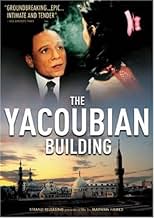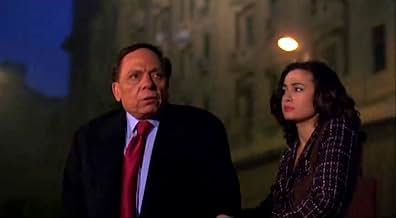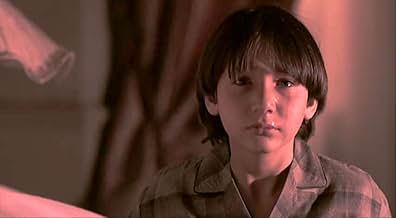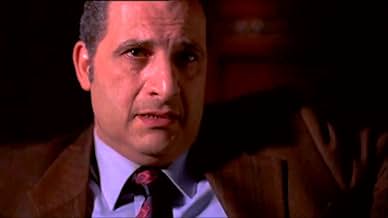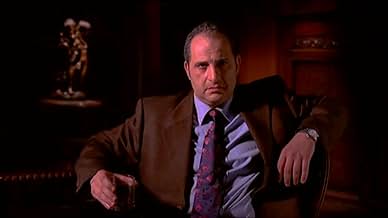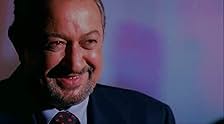IMDb RATING
7.5/10
7.6K
YOUR RATING
Meditations on corruption, fundamentalism, prostitution, homosexuality, and drugs in central Cairo.Meditations on corruption, fundamentalism, prostitution, homosexuality, and drugs in central Cairo.Meditations on corruption, fundamentalism, prostitution, homosexuality, and drugs in central Cairo.
- Awards
- 9 wins & 5 nominations total
Esaad Younis
- Dawlat El Dessouky
- (as Issad Younis)
Ahmad Bedair
- Malaak
- (as Ahmed Bedeir)
Hind Sabri
- Bothayna
- (as Hind Sabry)
Khaled El-Sawi
- Hatem Rachid
- (as Khaled El Sawy)
Basem Samrah
- Abd Raboh
- (as Bassem Samra)
Mohamed Emam
- Taha El Shazly
- (as Mohamed Imam)
Youssef Dawood
- Fekry Abdel Shaheed
- (as Youseff Daoud)
Talaat Zakaria
- Bar Owner
- (as Talat Zakariyya)
- Director
- Writers
- All cast & crew
- Production, box office & more at IMDbPro
Featured reviews
"They" say it's overly faithful to the bestselling novel by Alaa Al Aswany which I have not read. . For Egypt, Yacoubian Building is the most expensive film ever (quotes vary). Director Hamid was 28 when he made it and is the son of the screenwriter who did the adaptation. The film is an ambitious and promising if under-edited piece. Perhaps it ought to have been in parts like Marco Tullio Giordana's The Best of Youth/La meglio gioventù, to which it has been compared. But instead it's a somewhat sprawling 172 minutes and feels at times like a smashed-together telenovela.
Hollywood Reporter says the film may "offer a revealing window into the secular world of a modern Islamic country -- its indulgence in alcohol, sexual promiscuity, political corruption and personal betrayals. From such 'deformities, the movie argues, Islamic fundamentalism gains its most passionate adherents." But we can do better than this crude analysis. Moroccan-born ,western educated novelist Laila Lalani points out the book (and consequently the movie) is full of prejudices against gays, resembles the old "large-scale melodramas" produced by Egypt's "huge film industry," with their "young idealists, desirable ingénues, old predators, and so on," and is crudely moralistic -- with almost every character forced to make choices that "ultimately result in either their downfall or redemption." It's also full of heavy-handed emotional manipulation, cliff-hangers, and so on. Alaa Al Aswany is no Naguib Mahfouz. Aside from the prejudice against gays, we're told that mixed marriages produce confused children, that all women love sex enormously, and so on. It's important to realize that however engaging the film is and notable the actors are in the Egyptian film world, it's made out of dross, not gold.
The titular Armenian-owned, Twenties Yacoubian Building in the once elegant, restricted central zone of the city "became home to Cairo's rich and powerful when it opened," Lalani writes. After the revolution, however, "storage sheds on the rooftop were rented out to poor families--a sort of sky-high slum." This allows for a story about the building's residents that spans society. The action is set in the 1990's. And the basic panorama goes something like this:
In the foreground is Zaki Bey El Dessouki, or "Zaki Pasha" (Adel Imam), a superannuated playboy kicked out of the family apartment by his mean, half-crazy sister. He may seem seedy, but he's the house aristocrat. Fanous (Ahmed Rateb) is his faithful manservant. Dawlat (Essad Younis) is his nutty, vindictive sister, who has always resented his fun loving ways and not is out to get him. Hatem Rasheed (Khaled El Sawy) is a gay editor who takes a good-looking soldier Abd Raboh (Bassem Samra) .from the country as his lover. Rasheed isn't mincing, but he reflects an Egyptian discomfort with gayness; still, he's seen three-dimensionally. He likes dark Nubian men because they remind him an early experience with a family servant. The film's treatment of the sexual aspect of Hatem's relationship to the soldier feels like something made in the 1950's. In general sex is a burden for the people in this movie, either a risky temptation or an ordeal. It gets nasty, and then the camera shrinks away.
Haj Assam (Nour El Sheriff) is a self-made millionaire (through a chain of stores selling modestly-priced women's clothing) with political ambitious. wants to get into the People's Assembly (Majlis al Sha'ab) for access to power. He takes a penniless young widow with a young son, Soad (Somaya el Khashab), as a second wife and forces her to have an abortion. As Lalani puts it, Assam "is the nouveau riche to Zaki' Bey's aristocrat." The brothers Abaskharon and Malaak (Ahmed Bedire) are Coptic Christians who save every penny they make, by legal and illegal means, in order to finally afford a room on the roof.
On the roof are Taha (Mohamed Imam)and Buthayna (Hind Sabry). Taha is the son of a bawab. A bawab is a doorkeeper, more like a concierge or a super in New York rather than "janitor" as it's translated. With such a lowly father, Taha is turned down by the police academy as not socially adequate to become an officer, and adopts a "plan B," to major in political science, which leads him to sympathy with the university religions fanatics and he eventually becomes an Islamic fundamentalist. His girlfriend Buthayna leaves him when he becomes religious and eventually she goes to work for Zaki, who's reformed and treats her well. She's previously been sexually harassed in every job she's had -- as we're shown in a lurid scene. Perhaps she feels too defiled to be worthy of one so innocent and decent as Taha, and she seems hardened A reader has pointed out that she is much poorer in the book than here. Laila Lalani says, "Egypt's young men are easy preys to religious extremism while the country's young women are victims of sexual exploitation." Taha is imprisoned and given Abu Ghraib treatment that de-islamicizes him. To get revenge, he trains as a terrorist -- a chain of events that looks frighteningly up-to-date.
The film has little details any Cairo downtown resident will know -- like Zaki yelling angrily because another resident has left the door of the antique elevator open on their floor so no one else can use it. Though this isn't Naguib Mahfouz, like him it attempts to draw a richly representative picture of a whole society. It's a rather sad picture with its disapproval of the present and nostalgia for the past.. And again, despite the three or six million dollars spent, some exterior sound is awful, the wrong kind of lens is used to pan up and down the city buildings, and some of the Islamicists' beards look pasted on. But with all that's going on, it holds your attention.
Shown as part of the San Francisco International Film Festival 2007. Earlier in the year one of the Film Comments Selects series at Lincoln Center, New York.
Hollywood Reporter says the film may "offer a revealing window into the secular world of a modern Islamic country -- its indulgence in alcohol, sexual promiscuity, political corruption and personal betrayals. From such 'deformities, the movie argues, Islamic fundamentalism gains its most passionate adherents." But we can do better than this crude analysis. Moroccan-born ,western educated novelist Laila Lalani points out the book (and consequently the movie) is full of prejudices against gays, resembles the old "large-scale melodramas" produced by Egypt's "huge film industry," with their "young idealists, desirable ingénues, old predators, and so on," and is crudely moralistic -- with almost every character forced to make choices that "ultimately result in either their downfall or redemption." It's also full of heavy-handed emotional manipulation, cliff-hangers, and so on. Alaa Al Aswany is no Naguib Mahfouz. Aside from the prejudice against gays, we're told that mixed marriages produce confused children, that all women love sex enormously, and so on. It's important to realize that however engaging the film is and notable the actors are in the Egyptian film world, it's made out of dross, not gold.
The titular Armenian-owned, Twenties Yacoubian Building in the once elegant, restricted central zone of the city "became home to Cairo's rich and powerful when it opened," Lalani writes. After the revolution, however, "storage sheds on the rooftop were rented out to poor families--a sort of sky-high slum." This allows for a story about the building's residents that spans society. The action is set in the 1990's. And the basic panorama goes something like this:
In the foreground is Zaki Bey El Dessouki, or "Zaki Pasha" (Adel Imam), a superannuated playboy kicked out of the family apartment by his mean, half-crazy sister. He may seem seedy, but he's the house aristocrat. Fanous (Ahmed Rateb) is his faithful manservant. Dawlat (Essad Younis) is his nutty, vindictive sister, who has always resented his fun loving ways and not is out to get him. Hatem Rasheed (Khaled El Sawy) is a gay editor who takes a good-looking soldier Abd Raboh (Bassem Samra) .from the country as his lover. Rasheed isn't mincing, but he reflects an Egyptian discomfort with gayness; still, he's seen three-dimensionally. He likes dark Nubian men because they remind him an early experience with a family servant. The film's treatment of the sexual aspect of Hatem's relationship to the soldier feels like something made in the 1950's. In general sex is a burden for the people in this movie, either a risky temptation or an ordeal. It gets nasty, and then the camera shrinks away.
Haj Assam (Nour El Sheriff) is a self-made millionaire (through a chain of stores selling modestly-priced women's clothing) with political ambitious. wants to get into the People's Assembly (Majlis al Sha'ab) for access to power. He takes a penniless young widow with a young son, Soad (Somaya el Khashab), as a second wife and forces her to have an abortion. As Lalani puts it, Assam "is the nouveau riche to Zaki' Bey's aristocrat." The brothers Abaskharon and Malaak (Ahmed Bedire) are Coptic Christians who save every penny they make, by legal and illegal means, in order to finally afford a room on the roof.
On the roof are Taha (Mohamed Imam)and Buthayna (Hind Sabry). Taha is the son of a bawab. A bawab is a doorkeeper, more like a concierge or a super in New York rather than "janitor" as it's translated. With such a lowly father, Taha is turned down by the police academy as not socially adequate to become an officer, and adopts a "plan B," to major in political science, which leads him to sympathy with the university religions fanatics and he eventually becomes an Islamic fundamentalist. His girlfriend Buthayna leaves him when he becomes religious and eventually she goes to work for Zaki, who's reformed and treats her well. She's previously been sexually harassed in every job she's had -- as we're shown in a lurid scene. Perhaps she feels too defiled to be worthy of one so innocent and decent as Taha, and she seems hardened A reader has pointed out that she is much poorer in the book than here. Laila Lalani says, "Egypt's young men are easy preys to religious extremism while the country's young women are victims of sexual exploitation." Taha is imprisoned and given Abu Ghraib treatment that de-islamicizes him. To get revenge, he trains as a terrorist -- a chain of events that looks frighteningly up-to-date.
The film has little details any Cairo downtown resident will know -- like Zaki yelling angrily because another resident has left the door of the antique elevator open on their floor so no one else can use it. Though this isn't Naguib Mahfouz, like him it attempts to draw a richly representative picture of a whole society. It's a rather sad picture with its disapproval of the present and nostalgia for the past.. And again, despite the three or six million dollars spent, some exterior sound is awful, the wrong kind of lens is used to pan up and down the city buildings, and some of the Islamicists' beards look pasted on. But with all that's going on, it holds your attention.
Shown as part of the San Francisco International Film Festival 2007. Earlier in the year one of the Film Comments Selects series at Lincoln Center, New York.
What I like most about this movie is that it opens a window into an unknown world for me, that of relations between men an women in modern Egypt, and it does so in a style that is at the same time sumptuous an unfamiliar. People do things you wouldn't expect, despite the slightly heavy-handed handling of emotions. There are areas where the movie is not perfect: it is so highly pessimistic and denounces the greed and selfishness of Egyptian men with so much vigor that it appears somewhat simplistic. It does tend to ramble a bit. But the power and the humor of the movie (it is quite funny, despite being tragic) transcends all that and makes those minor faults. I understand the director is very young, so he will have ample time to overcome and transcend these youthful imperfections. I didn't like Slumdog Millionaire because it told me everything about India that I already knew: it feels like a package tour where you are shown the sites you expect to see, and are whisked from one location to another. For a western viewer, Omaret yakobean is like a journey where you land at the airport and are immediately carried away by the atmosphere, the culture shock, the bustling streets, the misunderstandings, from which you emerge with challenged assumptions and a wider view of the world.
I am still reeling from the dizzying marvel of the grand storytelling of this movie. No movie can be like a book. So I discount all who compare it to a book.
I cared so much for these people, their stories are topical yet universal. The anguishes, the struggles, the personal demons, stay with me...as reminders of the pain of all mankind.
"We are living in the age of deformity" said one of the characters... and so mankind still continues, forming, deforming, renewing itself. When will it end? These are the questions which this film asks of us all. But is the world deformed or - is it we who are deformed? While this movie will not answer such an unanswerable question out loud. We know the truth. But we seldomly face it...Some of us learn our lessons, some do not. But our pasts always come back to haunt us...
I know I've not said anything about the acting, nor the unmatched technical gifts of this movie...but they are what crown this magnificent achievement from the first delicate frame until it's bleak uncompromising ending...
The cinematography, editing, and music must be praised to the rooftops!
***** I recommend this movie to those who are not afraid to see the truth and see it told marvelously.
...
I cared so much for these people, their stories are topical yet universal. The anguishes, the struggles, the personal demons, stay with me...as reminders of the pain of all mankind.
"We are living in the age of deformity" said one of the characters... and so mankind still continues, forming, deforming, renewing itself. When will it end? These are the questions which this film asks of us all. But is the world deformed or - is it we who are deformed? While this movie will not answer such an unanswerable question out loud. We know the truth. But we seldomly face it...Some of us learn our lessons, some do not. But our pasts always come back to haunt us...
I know I've not said anything about the acting, nor the unmatched technical gifts of this movie...but they are what crown this magnificent achievement from the first delicate frame until it's bleak uncompromising ending...
The cinematography, editing, and music must be praised to the rooftops!
***** I recommend this movie to those who are not afraid to see the truth and see it told marvelously.
...
Omaret Yakobean is my new favorite movie because well everything about it is done perfectly, as in acting, music, storyline, characters... Also, it tackles so many issues and problems in the Egyptian society from corruption, to prostitution to homosexuality to many other things, things that the Egyptian cinema has been too conservative, or "shy" to handle because they are all taboo. But no! this movie tackles all these issues in an upfront and honest, yet classy and sophisticated way. However I have to point out that Mohammad Imam's performance was somewhat shaky, but he overall gave an OK performance for his first movie. On the whole, this movie is a breakthrough for the Egyptian cinema and in my opinion the best movie ever made in the history of the Arab cinema. Hopefully, more movies of that genre will be made in the future because every second of that movie was entertaining in every aspect and i was enjoying it until the very last second, and i even didn't want it to finish.this movie is just BEAUTIFUL!!!
10totta24
That's what I felt after watching that movie, it's really close to the society and the public's pulse, some overestimation is there but through comic frame, you'll enjoy watching that movie Marwan Hamed is not an ordinary director, he is one of the best around. i have never seen such a movie that tackles every issue in the Egyption society so honestly. it is a pure masterpiece and if i was running the Oscars then that movie will sure receive one. A movie so honest and directed, it is designed for all classes describing the social corruption in todays society - not only in Egypt but all around the world. if you miss this movie then you will spend your entire life regretting it so i advice every Arabic and non-Arabic speaker to watch the masterpiece and enjoy the art of this marvelous director whom i have a great respect for. two thumps up
Did you know
- TriviaOfficial submission of Egypt for the 'Best Foreign Language Film' category of the 79th Academy Awards in 2007.
- GoofsWhen Hatem is drinking while remembering his youth near the end of the film, he finishes his drink. Seconds later, he finishes it again.
- How long is The Yacoubian Building?Powered by Alexa
Details
- Release date
- Countries of origin
- Official site
- Languages
- Also known as
- The Yacoubian Building
- Filming locations
- Alexandria, Egypt(beach front)
- Production company
- See more company credits at IMDbPro
Box office
- Budget
- EGP 18,000,000 (estimated)
- Gross worldwide
- $2,414,837
Contribute to this page
Suggest an edit or add missing content


